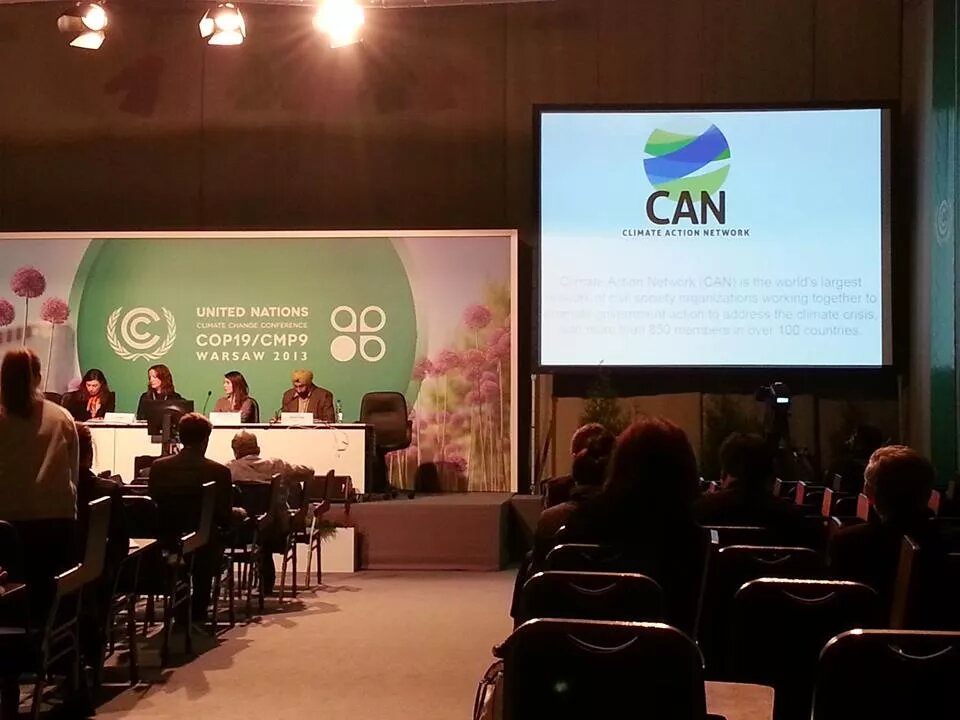
By Hussein Mohsen Kiswani
Between the 12th and the 23rd of November 2013, Warsaw hosted the 19th Conference of Parties (COP19) of the United Nations Framework Convention of Climate Change (UNFCCC). As the cold intensified in Warsaw, cold atmospheres penetrated indoors hitting the political mood in and around the conference meetings, making the political initiatives and solutions look meager and feeble, and affecting in return the ambitions and hopes of the participants, as well as of those who follow up the biggest annual congregation specializing in climate change.
In the plenary readings of the negotiation course and the stances of official delegations, it became clear from the early beginning that the main issue to be discussed in Warsaw will be how to address loss and damage. It's also clear that we are looking at an empty-handed conference, one that lacks progress in any real negotiated results with respect to any or the core issues: adaptation and alleviation, capacity building, and transfer of technology. This is despite the detailed submission by China, India, and Brazil, in which they put forward a new mechanism for addressing loss and damage, one that includes the formation of a coordination and follow-up body. The submission forms a central starting point for negotiations.
The world is witnessing a distinct increase of extreme weather events including cyclones and hurricanes, floods, drought, and famine waves sweeping the world, thus proving what science has foretold – in fact surpassing the limits foretold by science (Intergovernmental Panel on Climate Change Report of 2007). The background for introducing the principal of addressing loss and damage was when the international community admitted the impossibility of deterring the results associated with climate change, and the difficulty of adapting to the growing effects. Therefore, the situations resulting from adaptation are what needs to be addressed by the mechanism, as well as finding ways to compensate and relief those affected by the results of adaptation, in addition to attempting to repair and reform the resulting damage. In other words, the notion of addressing loss and damage was created to express post-adaptation procedures.
The countries affected by climate change have the right to demand compensation. Although this is acceptable by all negotiating parties, the developed countries fear the tactful commitments that may lead to indolence when it comes to adaptation, thus threatening the failure of coming negotiations. An example, inter alia, on this is the stance of the United States which approves the concept and refuses the formation of a special mechanism for addressing loss and damage. Such a fear is unjustified because the impacts of the climate change and the accompanying harms have already started, and no one can claim that adaptation is not needed. Having a mechanism or a specialized body to work on addressing loss and damage will at least allow for making some sort of change in reality. The biggest challenge however remains in mobilizing funds to feed the additional mechanism, bearing in mind that the other mechanisms relating to climate change suffer severe lack of funds, both in the mid and longer term. This is a result of the unfulfilled promises made by the developed countries in the COP15 meeting in Copenhagen, which were supposed to reach 100 billion dollars annually starting in 2020.
After lengthy debates and discussions over the course of the first week, the negotiators agreed to take the issue to the ministerial level. The second week was spent entirely on negotiating the establishment of the new mechanism specialized in addressing loss and damage for developing countries, called 'Warsaw Framework for Reducing Emissions from Deforestation and Forest Degradation (REDD+)' under the umbrella of Cancun Framework for Adaptation. An executive committee of the Warsaw international mechanism was established, which shall function under the guidance of, and be accountable to, the Conference of the Parties to guide the implementation of the following functions: a) enhancing knowledge and understanding of comprehensive risk management approaches to address loss and damage; b) addressing gaps in understanding of and expertise in approaches to address loss and damage; c) collection, sharing, management and use of relevant data and information, including gender-disaggregated data; d) strengthening dialogue, coordination, coherence and synergies among relevant stakeholders; and last but not least, e) enhancing action and support, including finance, technology, and capacity building.
This is indeed an important progress that Warsaw achieved, assuming that this step really proves to be a step in the right direction, and hoping that the Warsaw Mechanism plays an important role in easing the suffering of those affected by the impacts of climate change.
Heinrich-Böll-Stiftung Palestine/Jordan supported the participation of two environmental activists and experts from Palestine and Jordan in the COP19 in Warsaw. The views expressed in these articles are those of the authors and do not reflect the official opinion of the Heinrich-Böll-Stiftung.